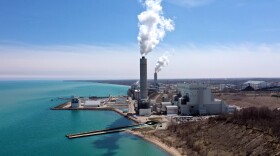Charles Fishman and Seth Siegel know a thing or two about water.
Fishman is author of The Big Thirst: The Secret Life and Turbulent Future of Water. Siegel wrote Let There Be Water: Israel’s Solution for a Water-Starved World.
They were among the 200 people interested in water issues who spent two days in Milwaukee this week. The draw was The Water Council’s 10th annual summit at which security was the theme.
Charles Fishman says cyber security does not get a lot of attention in the world of water, but should.
“If hackers can hack the CIA, if hackers can steal every personnel record of every federal employee of the United States - taking down a water utility plant or treatment plant would not be a problem,” Fishman says.
He says the cyber risk runs deep.
“Lots of people have water technology that has digital elements to it and those are connected to the water utility in your town," Fishman explains. "So there is vulnerability way outside the fence line of a water treatment plant."
He also notes that climate change is increasingly felt in water.
“That means that in Norfolk Virginia and in Miami Beach and also in Bangladesh, when there’s huge precipitation the flooding is worse than it otherwise would be.”
The U.S. military is not standing by idly.
“All the naval bases in Norfolk are being retrofitted to accommodate climate change. Regardless with what is happening inside the Beltway in Washington, folks who run the naval bases know climate change is real,” Fishman says.
He suggests you need only look to Syria to understand water’s impact on world events.
“The political environment in Europe, even in the U.S. in the wake of the last presidential election, questions about NATO - all of that has to do with concerns about immigrants….most of it is coming out of Syria. It’s the Syrian Civil War,” Fishman says. "It began to brew as Syrians gave up their farms, moved to the city and could not find work. They left the countryside because of water scarcity.
“And the reason there was no water in Syria was not that there wasn’t water. There was bad water management,” Fishman says.
Author Seth Siegel says in his research he learned water can be a tool for peace and cooperation.
“This rather remarkable fellow Uri Shani from Israel dreamed up this idea of how to rethink water in the Middle East," says Siegel. "How to find a way to have the Jordanians, the Israelis, the Palestinians working together to share water - they came up with their resolution by virtue of talking together.”
He calls the project a big step forward and a model from which other countries can learn.
“This will provide a way for them to have to work together, and what they have to do today will find a way of becoming a benefit for them and their interactions tomorrow. That will lead, I believe, no doubt to other opportunities for peace and peacefulness,” Siegel says.
Both Siegel and Fishman underscore the need of sound and coordinated water policy now.
Fishman says think of it like having a leak in your roof:
"Just like fixing a leak .....with good shingles….(it) is much cheaper than letting it go on and on and doing damage all through the house. All those problems in places where water is becoming a problem are fixable. They don’t cost that much to fix in advance.” Fishman adds that “the consequences of not fixing them as you can see, they can literally cascade of not fixing them, as you can see, they can literally cascade through the politics of whole continents.”
Seth Siegel says the word ‘delay’ is not an option.
“It’s not just me saying this, it’s the U.S. government now says that 60 percent of the world’s landmass, 40 of our 50 U.S. states will be facing water scarcity issues by the year 2025. That’s almost going. Let’s get going.” Siegel adds, “We have just enough time to put in the policy and technological and pricing mechanisms that we need to fix the problem.”






